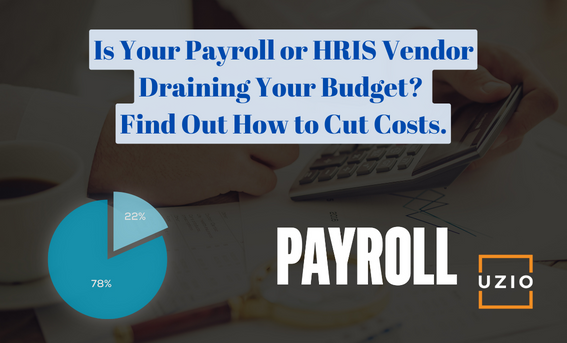1. Introduction
Are you getting squeezed by rising costs and feel like you are getting nickel and dimed for just about everything related to your payroll and HRIS? You are not alone, this unfortunate is a common challenge for many. As a business owner, you may have noticed that managing your employees’ payroll and benefits can be a time-consuming and challenging task. For this reason, many companies choose to hire payroll or HRIS (Human Resources Information System) vendors to manage their employees’ payroll, benefits, and other HR-related tasks.
But, be warned! It is not uncommon for these vendors to charge fees for just about every feature and payroll run you do. Let’s face it, this can add up quite quickly and put a dent in your budget. It is not uncommon for some SMBs to pay $5000 to $7000 and more a month. We have heard some of the larger SMB companies that are paying in the $20K range every month. Clearly that is a cost that really adds up. In this article, we will explore the various charges you may encounter. We will break down features we recommend are must have features versus the nice to have features. We will also provide recommendations on how to negotiate with your vendor to ensure you are getting the best value for your money.
2. The Different Charges You May Encounter
Before we dive into the details of how to negotiate with vendors, let’s first explore the different charges you may encounter when working with a payroll or HRIS vendor.
Subscriptions and Licensing Fees
Most payroll or HRIS vendors charge a subscription fee for their services. This fee is usually based on the number of employees you have or the features you need. Some vendors may also charge a licensing fee for their software. This fee is typically a one-time charge and is often higher than the subscription fee.
Implementation Fees
When you first sign up with a payroll or HRIS vendor, you may be charged an implementation fee. This fee covers the cost of setting up your account and integrating the vendor’s software with your existing systems.
Upgrade Fees
As your business grows and your needs change, you may need to upgrade to a higher-tier service plan or add additional features to your current plan. When you do this, you may be charged an upgrade fee.
Training Fees
If you or your employees need training on how to use the vendor’s software, you may be charged a training fee. This fee covers the cost of training materials and the time of the vendor’s staff.
Support Fees
If you need technical support or have questions about your account, you may be charged a support fee. This fee covers the cost of the vendor’s staff providing support to you.
Other Hidden Charges
Some vendors may also charge other fees that are not clearly stated upfront. These charges may include transaction fees, processing fees, or fees for additional services.
3. Understanding the Charges
Now that we have explored the different charges you may encounter when working with a payroll or HRIS vendor, let’s discuss how to understand these charges and negotiate with your vendor to get the best value for your money.
What Each Charge Entails
To understand the charges, it is essential to know what each fee entails. The subscription fee covers the cost of using the vendor’s software and services, while the implementation fee covers the cost of setting up your account. The upgrade fee covers the cost of adding features or moving to a higher-tier service plan. The training fee covers the cost of training materials and staff time, while the support fee covers the cost of providing technical support and answering questions.
Why These Charges Are Necessary for the Vendor
It is essential to understand that these charges are necessary for the vendor to stay in business. The subscription fee covers the cost of developing and maintaining the software, as well as the cost of providing support to customers. The implementation fee covers the cost of integrating the software with your systems, while the upgrade fee covers the cost of developing and implementing new features. The training and support fees cover the cost of providing these services to you.
What You Are Paying For
It is also crucial to understand what you are paying for with each fee. The subscription fee covers the cost of using the software and accessing the vendor’s services, such as tax compliance, direct deposit, and time and attendance tracking. The implementation fee covers the cost of setting up your account and integrating the vendor’s software with your systems. The upgrade fee covers the cost of adding additional features or moving to a higher-tier service plan, which can provide you with more advanced functionality, such as employee self-service portals, custom reports, and mobile access. The training fee covers the cost of providing training materials and staff time, which can help you and your employees become more proficient in using the software. The support fee covers the cost of providing technical support and answering questions, which can help you resolve issues quickly and efficiently.
4. How to Negotiate with Your Vendor
Now that you understand the different charges and what they entail, let’s discuss how to negotiate with your vendor to ensure you are getting the best value for your money.
Do Your Research
Before negotiating with your vendor, do your research. Understand the market and what other vendors are offering in terms of pricing and features. This will give you an idea of what you should be paying for and what features you should expect.
Understand Your Needs
Understand your business needs and what features are essential for your business. This will help you determine what service plan you need and what features you should be paying for.
Ask for Discounts
Many vendors are willing to offer discounts to retain customers. Ask your vendor if they can offer you a discount on your subscription fee or any other fees you may be paying. If you have been a customer for a long time, you may have some leverage in negotiating a better deal.
Negotiate Fees
If you feel that you are paying too much for a particular fee, such as the implementation fee or training fee, negotiate with your vendor. Explain why you feel the fee is too high and ask if they can reduce it. Vendors may be willing to negotiate if it means retaining your business.
Consider Bundling Services
Consider bundling services to get a better deal. For example, if you are paying for a subscription fee, implementation fee, and support fee separately, ask if your vendor can bundle these fees together for a lower overall cost.
Review Your Contract
Review your contract carefully before signing up with a vendor. Ensure that all fees and charges are clearly stated upfront, and there are no hidden fees. This will help you avoid any surprises down the road.
Recommended Reading: Biggest pain point with Payroll and HR software
Conclusion
As the business landscape continues to change – creating opportunities in some areas and declines in other areas. It is a very good idea to periodically take time to review opportunities to better manage and reduce costs when possible while looking for opportunities to drive growth. Beware of those hidden costs that can creep up to some pretty big numbers quite quickly. Managing your employees’ payroll and benefits can be a challenging task, but it doesn’t have to be costly. By understanding the different charges you may encounter when working with a payroll or HRIS vendor and negotiating with your vendor, you can ensure you are getting the best value for your money. Remember to do your research, understand your needs, ask for discounts, negotiate fees, consider bundling services, and review your contract carefully before signing up with a vendor.
FAQs
Q: Why do payroll and HRIS vendors charge multiple fees?
A: Payroll and HRIS vendors charge multiple fees to cover the cost of developing and maintaining their software, providing support to customers, integrating their software with a business’s existing systems, and providing training and technical support to customers.
Q: How can I negotiate with my payroll or HRIS vendor?
A: To negotiate with your payroll or HRIS vendor, do your research, understand your business needs, ask for discounts, negotiate fees, consider bundling services, and review your contract carefully before signing up with a vendor.
Get in touch with us for an expert-led demo to know more about UZIO payroll services.















